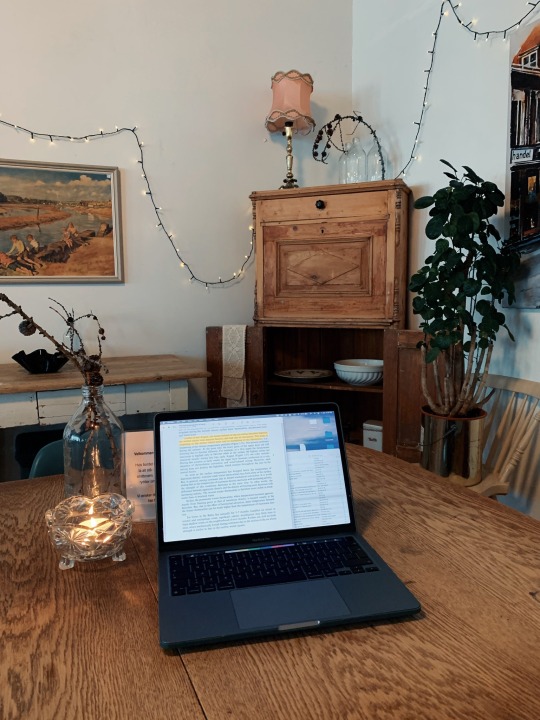Text
i actually like freddy carter's casting as kaz. sure he's not the lean mean brown man i was expecting, but he has the face of a starving victorian street urchin that fits the streets of ketterdam perfectly. like i believe that man would kneecap a rich industrialist for a hot sandwich
1K notes
·
View notes
Text




9 . 1 9 . 2 0
walking downtown to get tea or coffee then chilling on a rooftop is my new favorite break from online classes ☁️
1K notes
·
View notes
Text
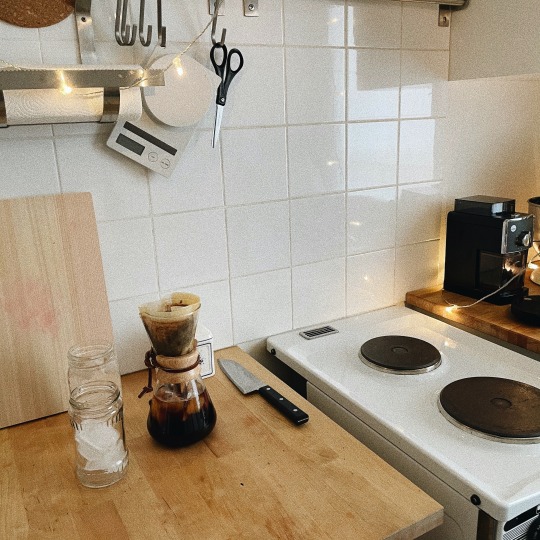

20.04.21, tuesday, 14:11
me, trying to concentrate.
my brain:
IF YOU LIKE PIÑA COLADAAAAAAS
634 notes
·
View notes
Photo



15.02.21, monday
morning, afternoon & evening; from calm to an absolute chaos.
9K notes
·
View notes
Text
how to study with a mental illness!!!! aka a guide to simultaneously caring for yourself and your academics
(disclaimer: this is from purely personal experience and is not a substitute for seeking professional help. these are just personal tips as i was formally diagnosed with depression and anxiety in the third year of college, but had been showing symptoms even in high school. different methods help for different people, but i really hope some of these things can help a struggling student out, because one of the reasons i went on studyblr in the first place was that i felt really lost and anxious.)
1. done is better than none.
sometimes an assignment you have to turn in would be objectively easy to complete, but it takes longer to do so because you’re afraid that the final product won’t be as good as you want it to be, or as good as a professor expects it to be. it’s hard to remove those expectations, but it is a little easier when you remember that getting some points (no matter how many they are) are better than getting a deduction for late submissions or not turning in the project at all. many people – including myself – suffer from perfectionism in university, but it is overall more important to complete something to the best of your own ability, and learn from the feedback on the project later on.
more importantly, often, you’re doing better than you think you’re doing, so surprise yourself. you can do it. just start.
2. keep careful track of your deadlines.
much of my undergrad anxiety came from the fact that i knew something was due, but couldn’t keep track of it, or didn’t want to confront it. it’s better to confront it because you have more time to do it slowly and thoroughly. as soon as you hear about an impending exam or paper deadline, keep track of it. personally, i use google calendar. from there, you can make smaller plans and break down your goals to make it more doable!
3. don’t be afraid to ask for help.
there used to be a huge stigma against mental illness, but thankfully, many educational institutions are much kinder and more considerate about it. if you really can’t meet a deadline or come to class, let your professor know. most professors are kind, reasonable people who genuinely care about you and your well-being. even one of my scariest professors granted extensions to a girl who was genuinely struggling with serious depression, and the college of law i’m in takes mental health very seriously to the point that they instruct faculty how to deal with such cases.
if you’re not able to talk to a professor, try to ask help from a classmate or a friend who can share notes or fill you in on how they accomplished a certain assignment. many people will be happy to help. you are not a burden, love.
4. be kinder to yourself.
mental illness is like any illness. it often keeps us from doing as well as we’d like to be because it’s a genuine and serious health problem. sometimes it helps to keep this in mind when we flub a report in class (as i did several tens of times in undergrad), get a bad score, say something ridiculous during recitation, or mess up a paper. it’s okay to do your best while you heal. you know you’re trying your best, and slow growth is still growth.
5. on that note, care for your other needs.
one of my happiest and most fulfilled semesters (even though it was my busiest) was when i had time to see a psychiatrist, run, pack lunches and fruit to school to eat healthy, and have a reasonable-ish sleep schedule. this was during my thesis semester. while i had to take an incomplete, and finish my thesis the next sem, because i was attending to my own needs, i felt like a living, breathing, learning, happy person. and i finished my thesis the next semester. it’s better to look after your own physical health and needs before your academics.
6. sometimes, it’s better to do nothing and rest. you deserve it.
part of the reason i’d been doing horribly in law school was that i didn’t sleep and it was making me mildly unbalanced and incredibly suicidal; not to mention the fact that i wasn’t really retaining any information or performing well.
rest days are just as important as days when you study because rest IS productivity.
7. take your meds. see your psych or therapist if you have one. avail yourself of mental health services on campus if there are any. these genuinely saved my life at a time that i thought i was beyond saving. please go seek help if you can.
BONUS: MY STUDY SETUP ON A TERRIBLE MENTAL HEALTH DAY (like today)
- i try to clear the space and clean up as much as possible. it makes me feel like i have things under control, and have my work things where i can see them.
- i eat something healthy, like fruit, and get a lot of water. i keep a water jug on my desk because it clears my thoughts and helps me replenish the fluids lost from crying (1/2jk). it also really keeps up my strength for the study process.
- i turn on a calming playlist, like a jazz or lofi or ghibli playlist. in another window, i turn on a rain sound video on a softer volume, and it helps center me.
- it helps when you have a soft or calming scent to calm you down. i use a lavender room spray, and it makes me feel cozy and productive, but in undergrad, i used this tea-tree lavender mix and it smelled like sunny afternoons and guitar coffeshop playlists. it really is nice.
- there are breathing exercises and gifs all over the internet. they help calm you down when things seem Too Much.
i really hope this helps, guys. don’t hesitate to message me if you’ve been having a hard time with school or life or anything. please, please care for yourselves. you can do it.
– sam
11K notes
·
View notes
Text
Academic Writing Resources
General:
The Five-Paragraph Essay
Using Punctuation Marks
Deadly Sins Checklist
Formatting Your Paper
Writing About Literature
Basic Essay
Revision Checklist
Planning and Organization
Editing and Proofreading
Latin Terms
Essay Structure
Tips on Introducing Quotes
Academic Writing Tips
Introductions:
Introductory Paragraphs
Introductions
Writing an Introduction
Preparing to Write an Introduction
Introduction Strategies
The Introductory Paragraph
Writing Effective Introductions
In The Beginning
Introductions and Conclusions
The Introductory Paragraph
Writing Introductory Paragraphs
How to Write an Intro
Body Paragraphs:
Paragraph Development and Topic Sentences
Transitions
Transitions
Transitions
Four Components of an Effective Body Paragraph
Writing Paragraphs
Paragraph Development
Body Paragraphs
Body Paragraphs
Strong Body Paragraphs
Body Paragraphs
Writing Body Paragraphs
How to Write Body Paragraphs
Writing the Body
Writing Body Paragraphs
Body Paragraphs
Body Paragraphs that Defend a Thesis
How to Write Body Paragraphs
The Perfect Paragraph
Topic Sentences:
Topic Sentences
Writing Topic Sentences
Topic Sentences
Topic Sentences
The Topic Sentence
Paragraphs and Topic Sentences
The Topic Sentence
Topics, Main Ideas, and Topic Sentences
Writing a Good Topic Sentence
Good Topic Sentences
Conclusions:
Writing Effective Conclusions
Introductions and Conclusions
Conclusion Paragraphs
Conclusion Strategies
Conclusions
Tips for a Strong Conclusion
The Concluding Paragraph
Ending the Essay
Types of Conclusions
Writing a Strong Conclusion
How to Write a Conclusion
Writing Conclusions
Guide to Conclusions
Thesis Statements:
The Thesis Statement
Thesis Statements
Writing a Thesis Statement
Thesis Statement
Tips and Examples
Writing a Thesis
Writing the Thesis
How to Write Your Thesis
The Thesis
Thesis Statements
Guidelines for Writing a Thesis
Thesis Statements
Thesis
Thesis Statements
The Thesis
Create a Strong Thesis
How to Write a Thesis
Developing a Thesis
Guide to Writing Thesis Statements
Thesis Statements
Citing:
When to Cite
APA Documentation
MLA Documentation
Suggestions for Citing Sources
Research and Citation Resources
Citation Information
MLA Guidelines for Citing Poetry
MLA Style for Poetry
How to Format Your Paper
Argumentative Essays:
Argumentative Essays
Argument
Argumentative Essays
Persuasive or Argumentative Essays
Argumentative Essay
Argument/Argumentative
Argumentative Essays
How to Write a Good Argument
How to Write an Argumentative Essay
Writing Conclusions to Argumentative Essays
Argumentative Essay
Persuasive Essay Writing
Writing Concluding Paragraphs
Constructing the Argumentative Essay
Writing About Poetry:
Writing About Poetry
Writing About Poetry
Writing About Poetry Q & A
Poetry Explications
Writing About Poetry
Writing About Poems
Explicating a Poem
Writing About Poetry
Writing a Thesis Paper About a Poem
How to Start a Poetry Introduction
Poetry Essay Structure
Poetry Explication
Expository Essays:
Structure of a General Expository Essay
Expository Essay Examples
Sample Expository Essay
Expository Writing
Expository Essay Model
Elements of Expository Essays
Expository Writing Information
Expository Essays
Writing Expository Essays
How to Write an Expository Essay
Tips on Writing an Expository Essay
Expository Essays
Essay Map
Writing Expository Essays
How to Create a Strong Expository Essay
Expository Essay Writing
The Expository Essay
Research Papers:
How to Write a Research Paper in Literature
Writing a Research Paper
The Research Paper
How to Write a Research Paper
Five Paragraph Research Paper
Sample Research Paper
Writing a Research Paper
Tips for a Research Paper
How to Write a Research Paper
Writing a Scientific Research Paper
Writing Research Papers
Research and Writing
Research Papers that Rock
How to Write an Effective Research Paper
College Application Essays:
Application Essay Tips
Application Essays
Tips
10 Tips
Application Essays
How to Write a College Application Essay
Tips for an Effective Essay
Do’s and Don’t’s
College Application Essay
How to Write a College Application Essay
Narrative Essays:
Narrative and Descriptive
Narrative Essay Writing
The Personal Essay
Narrative Essays
Narrative Essays
Writing Narrative Essays
Narrative/Descriptive
Narrative Essay
Writing a Narrative Essay
Tips on Writing a Narrative Essay
96K notes
·
View notes
Text
Transition Words For Your Essays
Transition Signals:
Transitions are words and phrases that connect ideas and show how they are related.
To repeat and ideas just stated:
In other words,
That is,
To repeat,
Again,
To illustrate an idea:
For example,
For instance,
In particular,
To illustrate,
In this manner,
Thus,
To announce a contrast, a change in direction:
Yet,
However,
Still,
Nevertheless,
On the other hand,
In contrast,
Instead of,
On the contrary,
Conversely,
Notwithstanding,
In spite of this,
Time:
At once,
In the interim,
At length,
Immediately,
At last,
Meanwhile,
In the meantime,
Presently,
At the same time,
Shortly,
In the end,
Temporarily,
Thereafter,
To restate an idea more precisely:
To be exact,
To be specific,
To be precise,
More specifically,
More precisely,
To mark a new idea as an addition to what has been said:
Similarly,
Also,
Too,
Besides,
Furthermore,
Further,
Moreover,
In addition,
To show cause and effect:
As a result,
For this reason,
Thereafter,
Hence,
Consequently,
Accordingly,
Conclusion:
In short,
To conclude,
In brief,
On the whole,
In summary,
To sum up,
679K notes
·
View notes
Text



March 29, 2021 [2021년, 3월, 29일]
Here is my daily study space. I find it really relaxing to study next to such big windows, it makes me happy.
The semester is coming to an end soon! Time really does move fast... I hope everyone’s midterms having been good.
534 notes
·
View notes
Text
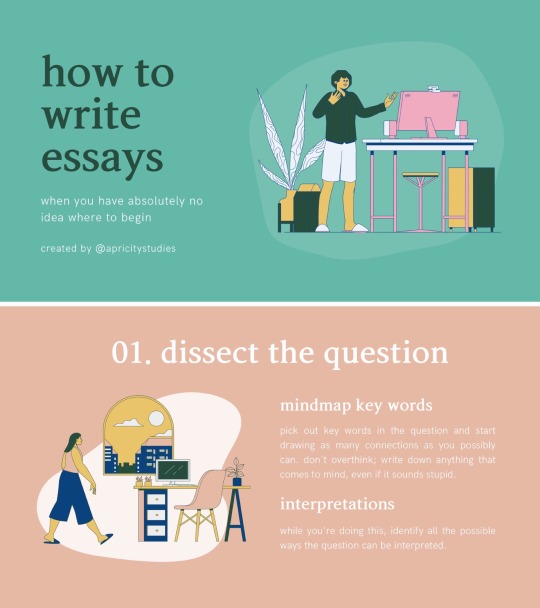

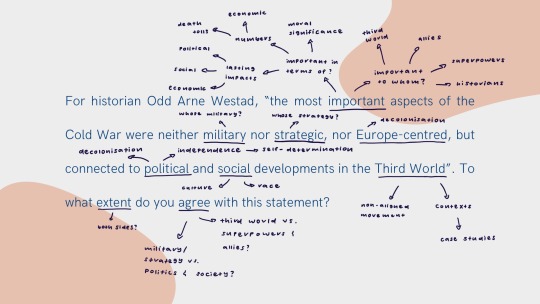
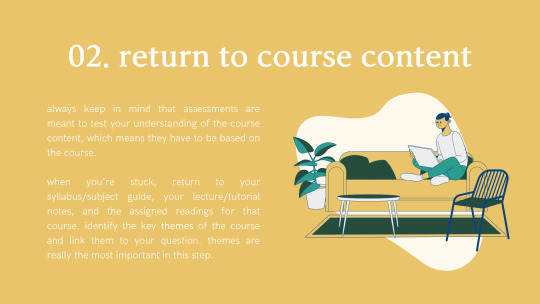
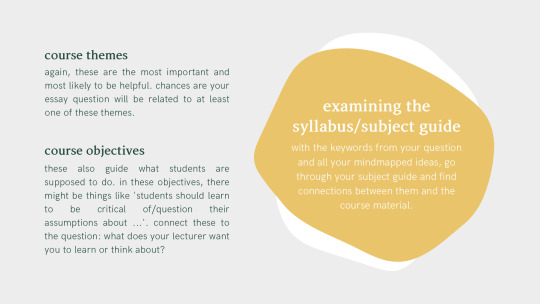
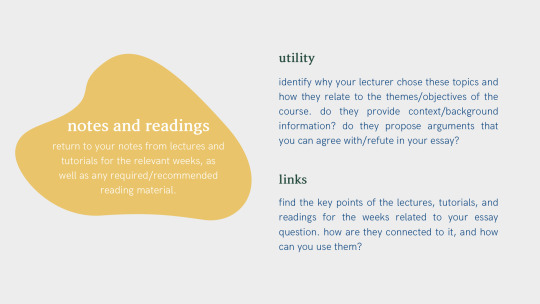
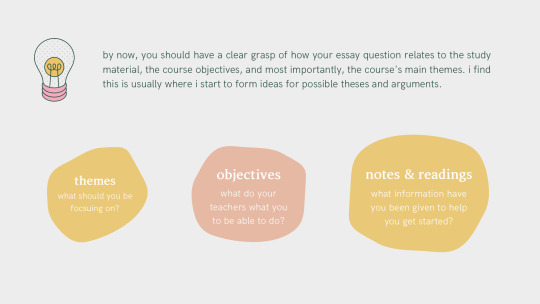
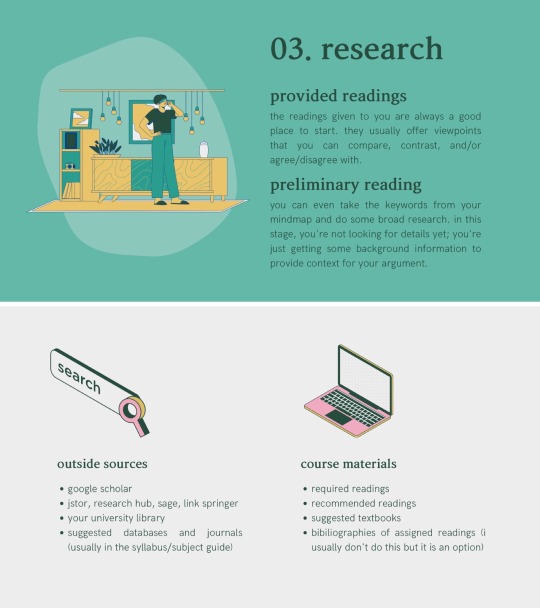
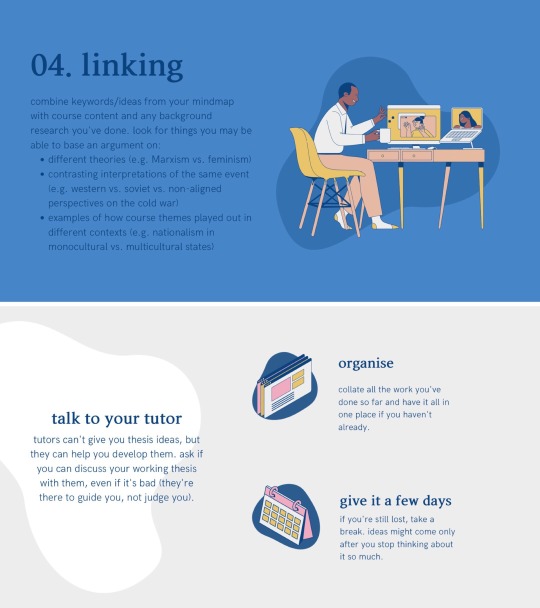
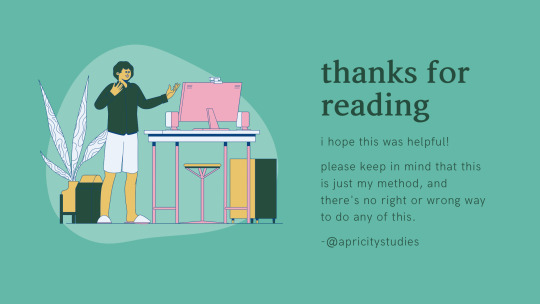
here’s my brainstorming process for writing essays! the example questions i used are pretty straightforward but i use this for more abstract essay questions as well.
3K notes
·
View notes
Text
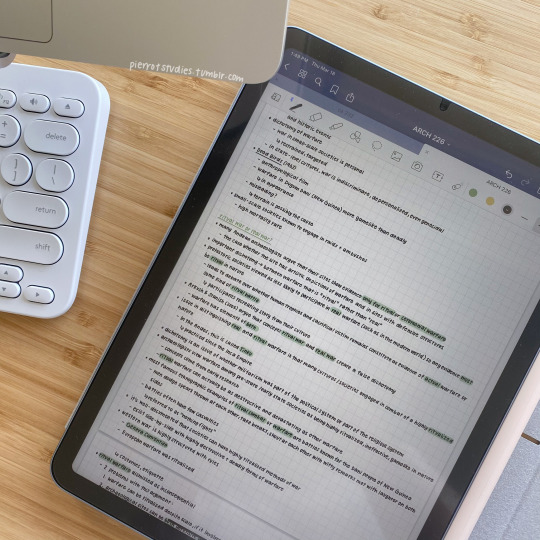

18.03.21
doing some of my archaeology online lectures before I share some footage from my film for class
studygram: @inkpierrot
735 notes
·
View notes
Photo
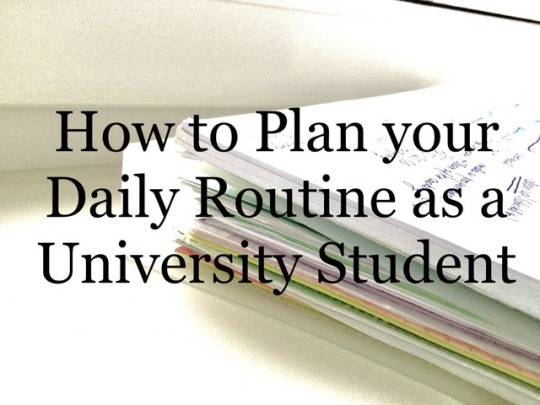
This isn’t just advice for uni students, but for anybody, I’ve just decided to tackle us uni students in general, because our days are not as structured anymore and with our lectures here at 11AM on one day and at 3PM on the other, it’s very hard to keep each and every day the same. Generally, though, this can be used for anybody who’s looking for some structure in their life.
Why?
Because it gives you an idea of what you are spending your time on. With a solid and good schedule, there should be less time for procrastination. Besides that, a sense of control gives many people comfort, especially people who struggle mentally.
Where to start:
Write down your schedule. Work, weekly appointments, lectures, classes. All those things that are ‘set in stone’ and that you cannot control. This is going to be the base you build around. I suggest making a table, preferably on a piece of paper (you can transfer it into a digital version when you’re done and have everything figured out) with all days of the week and hours. I personally used 7AM – 11PM.
Set your wake up and bed times. The most important ones. You should make these all the same. Maybe give yourself an extra hour of a lie in on Saturday and Sunday, but you should try and not confuse your biological clock too much. Soon, it will become easier to get up early. Also make sure you are getting enough hours of sleep. As a young adult of around 20, you should be getting 6-9 hours of sleep. If you are younger, it should be more than that.
Write up your daily tasks that you would like to perform every day. Make sure you include all those things you keep forgetting, self-care items, daily reading, journal writing, studying, etc. Be realistic, however. Start out small with just a few things, don’t overwhelm yourself and later, you can start adding more items.
Then do the same for weekly tasks. These include doing readings for particular classes, clean ups, exercise, meet-ups, etc.
Don’t forget meals! Especially if you are busy, make sure there is room for food in your plan! Make sure that if you have an especially full day the next day, think of some time to prepare the food the night before. Planning out your meals may also make you think about what you eat more. (Also, I can write something about nutrition on request!)
Don’t forget free time either. Free time is important and a free day is something you could benefit from. Whether it is resting or catching up on your studies or time for arts and crafts.
Now play a nice game of Tetris and assign a time slot to each of those activities. Don’t forget to just leave some time off. Whether that’s for finishing a task, being lazy or just anything. Use your routine to give your life a structure, not govern it completely.
How to implement these and make sure they work?
There are for sure going to be some you struggle with. Set phone alarms. Set them for every five minutes. Set them until they annoy you. Until it’s so annoying it makes you do the task you don’t want to do.
I followed these steps to make my own routine for my new semester and I had something similar, but not as elaborate last semester. The one for this semester isn’t done yet since I still need one additional module and my fixed working times. But after that, I may post my routine on here and then some follow ups as well, just to see how well it’s going. Same goes for you, tag me (ravenclawhard) if you are going to use these tips. I’d love to know!
8K notes
·
View notes
Text

𝐣𝐚𝐧𝐮𝐚𝐫𝐲 𝟏𝟑, 𝟐𝟎𝟐𝟏
— i finally started my classes yesterday! turns out my profs for most of my classes decided to do choose both asynchronous and synchronous methods to go about online classes this term. yesterday, wasn’t very productive because i had work :( so i’m catching up today because i don’t have classes at all. happy wednesday everyone ( ˘ ³˘)♥︎
6 notes
·
View notes
Text
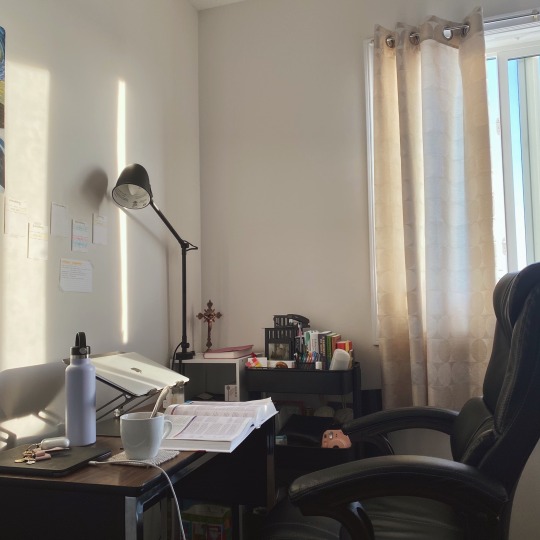
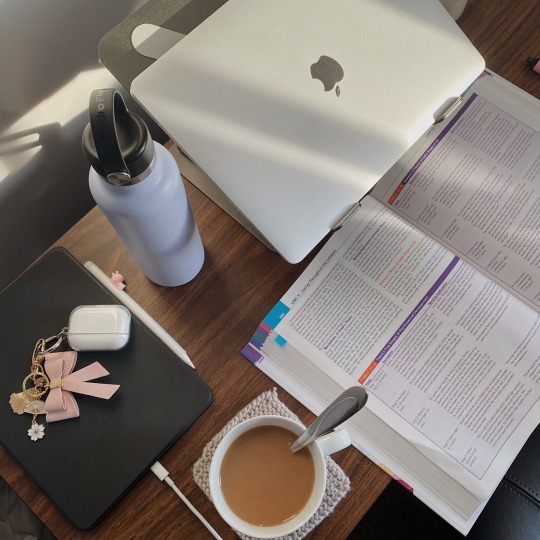
𝐟𝐞𝐛𝐫𝐮𝐚𝐫𝐲 𝟏𝟕, 𝟐𝟎𝟐𝟎
— currently on my reading break! it’s been a rough month trying to balance everything while not destroying my mental health. i haven’t been super productive at all but hoping i can use the rest of this week to catch up. reminder to keep going and rest if needed (´。• ᵕ •。`)
3K notes
·
View notes
Photo

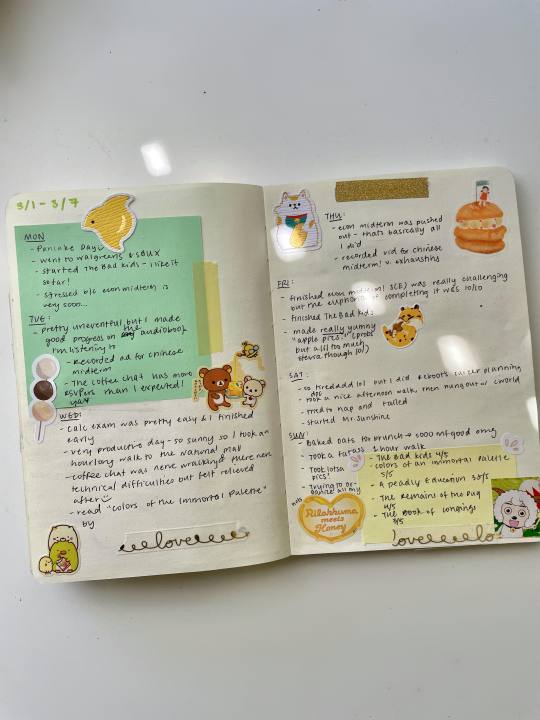
95/100 – this entire month has been midterms and it’s so exhausting
853 notes
·
View notes
Photo

10.03.2021
Hey there!
Starting a studyblr so I can find my creative voice again.
About me
Currently a grad student in design in the Netherlands
24
Likes reading, anime, Japanese, dancing to afrobeats, and collecting notebooks.
627 notes
·
View notes
Text


14.03.2021
I’ve been trying/exploring a new style of note-taking lately and it’s so much more effective than my old style ✨
1K notes
·
View notes

